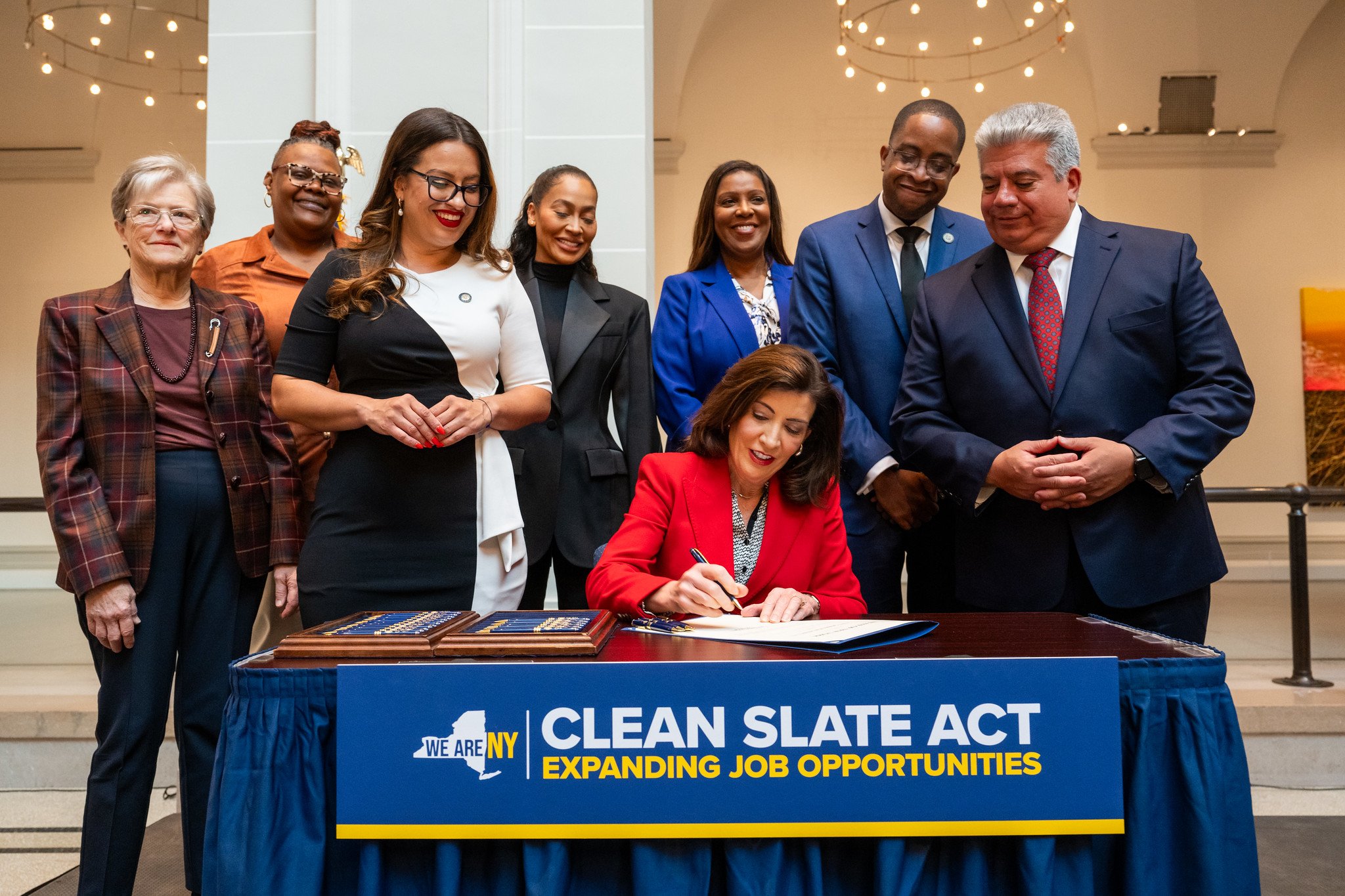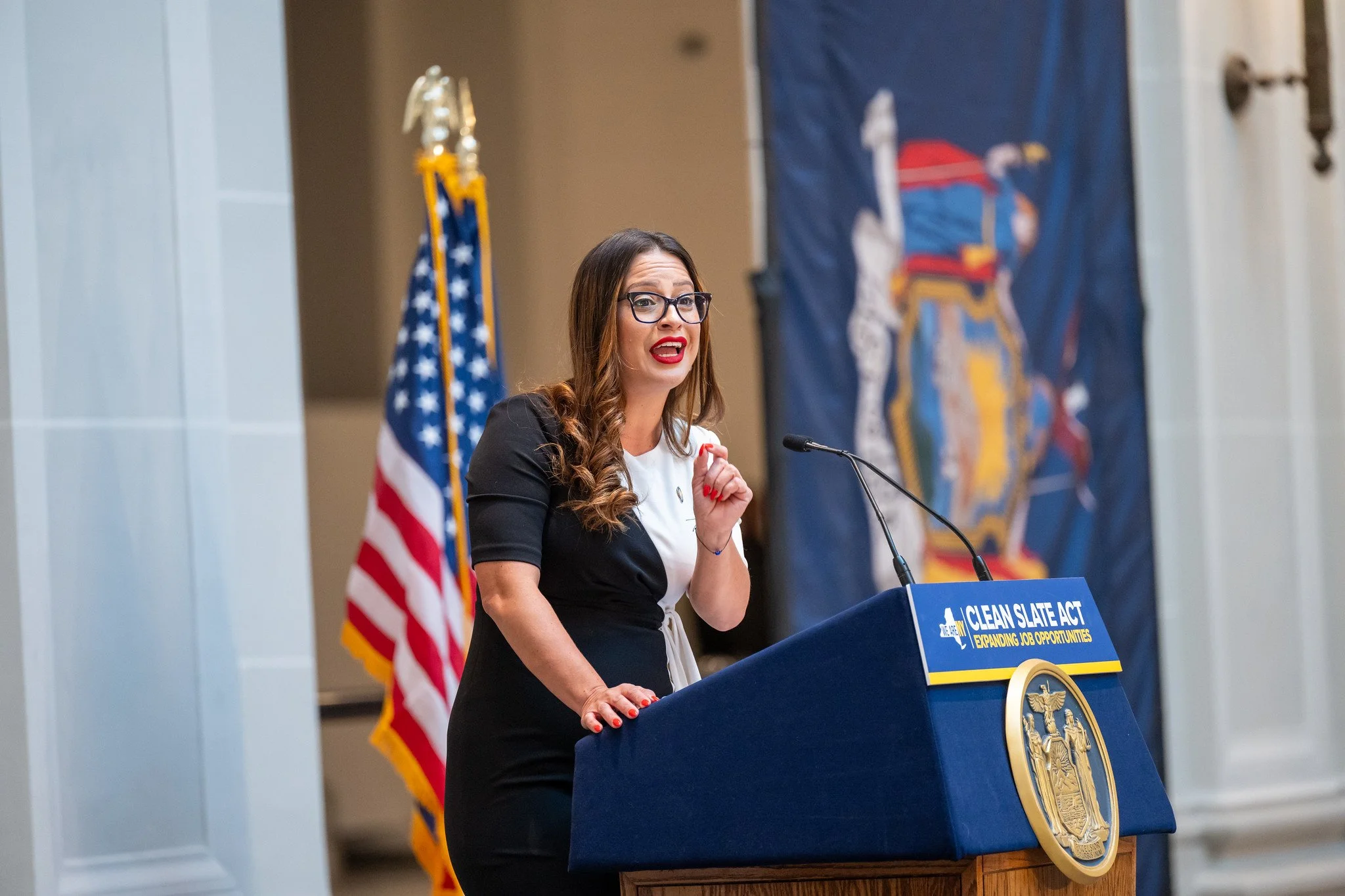NY to soon seal convictions of over 2 million New Yorkers
/Governor Kathy Hochul signed the Clean Slate Act on Thursday, which will seal the convictions of more than two million New Yorkers. Photo by Susan Watts/Office of Governor Kathy Hochul
By Ryan Schwach
The Clean Slate Act, a historic bill that will eventually automatically seal the convictions of over two million New Yorkers, was signed into law by the governor on Thursday.
A long fought for criminal justice measure pushed for by advocates, business leaders and Queens legislators, the bill, which has seen four different iterations in the state legislature, is lauded by advocates as a new start for New Yorkers who’s prior convictions held them back from work and housing opportunities, and also address the state’s labor shortage and provide an economic boost.
“They've paid their debt to society, let's make that very clear,” Hochul said during a bill signing ceremony in Brooklyn on Thursday. “They've gone through the process, they did their time, they're done. When they re-enter society, there's still barriers to housing and jobs. I say no more.”
“Today, we're here today to correct that injustice,” she added.
The Clean Slate Act will seal, not expunge, the criminal records of individuals previously found guilty after a certain passage of time depending on the severity of the crime. Those convicted of misdemeanors would see their records sealed three years after the completion of their sentence. For those convicted of felonies, their records would be sealed eight years after the completion of their sentence.
Regardless of the conviction, New Yorkers hoping to get their records sealed under the Clean Slate Act would not be eligible should they be convicted of a new crime. Most class A felonies, including sex crimes and murder, will not be eligible for sealing.
The bill will go into effect next year, and it will be another three years until the first convictions are sealed.
Ultimately, advocates say the law will make it easier for individuals to find work and other opportunities without the burden of their conviction.
During her remarks at the Brooklyn Museum Thursday morning, the governor said that Clean Slate will help lower recidivism and keep New Yorkers safe.
“I believe that the best anti-crime tool we have is a job,” she said. “When people have steady work, they're less likely to commit crimes and less likely to be homeless.”
Queens Assemblymember Catalina Cruz was the bill’s main sponsor in the State Assembly, dating back to previous iterations in the 2021-2022 legislative session.
On Thursday, the lawmaker for Corona, Elmhurst and Jackson Heights spoke with visual emotion and excitement over the bill’s signing.
“Today we're going to begin to change the lives of 2.3 million people in this state and their families,” she said. “Let that sink in. We're going to start breaking that cycle of poverty and injustice that's been perpetrated by a criminal justice system that was designed to do exactly what it's doing right now – to keep people eternally under its thumb, and changing generations to come.”
Queens Assemblymember Catalina Cruz, the bill’s lead sponsor, celebrated Governor Kathy Hochul’s signing of the Clean Slate Act on Thursday. Photo by Susan Watts/Office of Governor Kathy Hochul
“This legislation isn't just about criminal justice,” Cruz added. “It isn't just about public safety, it isn't just about economic justice, It's about redemption. Because people can change, people can get better, people can repent and people can and should be forgiven.”
It’s been a long time coming for the now-celebrated piece of legislation, which went through a number of changes to become more palatable for some of the state’s top lawmakers.
Clean Slate was first proposed in the 2019-2020 legislative session by Brooklyn State Senator Zellnor Myrie. The original version of the bill aimed to expunge criminal records rather than seal them. It never made it out of committee.
The following session Myrie proposed it again. It was passed by the Senate by an 11-vote margin in June 2022, but never saw a vote in the Assembly chamber, as Cruz’s equivalent of the bill didn’t get out of committee.
At the time, Democrats were reportedly worried about appearing soft on crime ahead of the midterm elections, and Hochul herself was running against Representative Lee Zeldin, who ran a campaign fiercely aimed at crime and safety in the Empire State.
Myrie and Cruz attempted to pass the bill again this year, and still faced pushback and hesitancy from other elected officials, including Hochul, who said earlier this year that there were “areas we wanted to fine tune” in the bill.
“I did want to get a version of Clean Slate that actually deals with the efforts to make sure that people have a second chance – I think that's going to help with recidivism,” the governor said when asked what she’d like to see done before the end of the legislative session. “But we also have to be smart about it and find out – are there opportunities to find out if there is a record in another state, for example? And has someone else been convicted of a crime related to sexual assault or something dealing with children?”
The bill Hochul adorned with her signature on Thursday seemed to address some of those concerns.
“We're not sealing records for sex crimes are most Class A felonies,” Hochul said. “Employers and the public have a right to know about the sex offenders and the worst violent criminals before they give them a job. This only seals crimes for certain civil purposes just as for job applications, which is what we're doing here today, and housing applications, law enforcement will always have access to these conviction records.”
During her speech, Hochul looked to dispel “mis-information” about the bill’s specifics.
“This will not change access to records for murderers, sex offenders or domestic terrorists,” she said. “It will not change records for law enforcement or for gun safety background checks, it won't change the sex offender registry.”
The bill’s signing on Thursday received applause from criminal justice groups and nonprofits, including the Legal Aid Society, the NYCLU and New York City Bar President Susan Kohlmann.
The wait for the bill’s passing however, weighed heavily on those directly impacted by the state laws the bill looks to amend, many of which are Black and brown New Yorkers.
“It's like lifting a weight off of us,” said Ismael Diaz, a 53-year-old Brooklyn man who spent 10-years in prison, and has spent the seven-years since his release struggling to find work and housing.
“It'll allow me the freedom to pick and choose a job and actually get paid for my work and not settle for just a job that I know I'm overqualified for,” said Diaz, who has a bachelor’s degree in behavioral science and has been turned down for jobs, and fired from short lived employment after a background check was completed.
“[Clean Slate] allows me to go into an interview and not get mentally challenged like, ‘Oh, they did an interview, but they're going to turn me down because of my background,’” he said.
Diaz is in a group chat with over 120 formerly incarcerated individuals, some of whom said they had a hard time believing the bill had actually been signed into law.
“It’s real,” he said he wrote to the group.
“It's a lot for us to get something so big, it means a lot to all of us,” he said.





